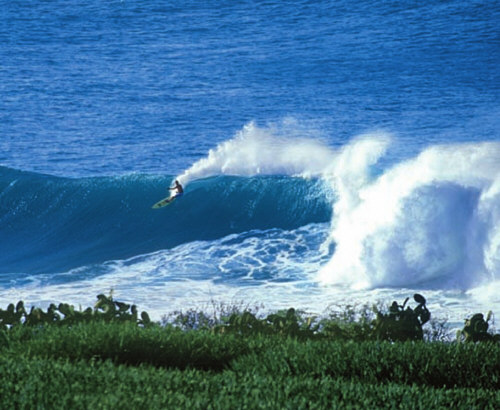ON THE OCEAN
I NEED THE OCEAN. YOU NEED THE OCEAN.
AND MEAN WHILE, THE OCEAN ALSO NEEDS US.
THE BLUE PLANET BLUES Water is the essence of life. Our planet’s made of water. We’re made of water. Our blood contains the same trace minerals as seawater, only in slightly different proportions. The oceans cover more than three-quarters of the earth’s surface, provide 50 percent of our oxygen, and are home to more than 80 percent of all known life forms. As a species, we’re connected to this realm; and for me, personally, it also serves as both my workplace and my inspiration. I’m dependent on the ocean to bring me fulfillment, challenge, and all the things that make up who I am. I need to spend a certain amount of time alone, and I get that in the water. The ocean gives me solitude—there’s no access; no one can get to you there. At times I feel as though I belong out there more than I belong on land. And anyone else who feels the same way, who loves the ocean, is a friend of mine.
Unfortunately—and it’s becoming more obvious every day—we’re doing a terrible job of taking care our waters. Whether it’s by polluting them with chemicals and plastics or by overfishing or by unraveling the web of life by exterminating species—the list goes on. The really crazy part about all this is that we’re the ones who will pay for it. We mess with the oceans at our peril.
We know pathetically little about how the oceans work in the larger scheme of the earth. We’ve discovered that they control our climate, but we don’t understand exactly how; we know that the depths are vast, but we’ve explored only a fraction of them. One thing we do know is that the ocean can—and does—unleash a tremendous amount of power. Anyone who didn’t already know how strong these forces are witnessed it firsthand in 2004 when the tsunami hit Indonesia. And again in 2005, during Hurricane Katrina. But it shouldn’t take something so extreme before we respect the waters that surround us.
On some days I feel more hopeful than others, but there aren’t too many signs of things changing for the better. I’m thinking about Japanese fishermen rounding up dolphins in a cove in Taiji, Japan, and slaughtering them until the water is bright red with their blood. Apparently they kill hundreds every year because they consider dolphins to be pests who eat fish, stealing their livelihood. There’s been some news coverage of that, at least, thanks to Australian surfer Dave Rastovich, the American actress Hayden Panettiere, and their friends, who paddled out to try to surround a pod before a fishing boat got to it. The boat beat them. Hopefully, others felt the same outrage that I did when I saw it.
Dolphins are magnificent creatures. Whenever I see them when I’m in the water, that’s a good day in my book. I’ve watched dolphins do astonishing things, and I’m convinced that we know very little about them. There is no possible justification for what the Japanese are doing in that cove. And they know it—the place is cordoned off with barbed wire. They would really prefer that you don’t know the first thing about it. That kind of insensitivity, that arrogant disrespect for life—are we, as custodians of this place, going to let that be our legacy?
There’s another book’s (at least) worth of stories to be told about the harm that’s being done to sea creatures. But here’s another concern. When I’m in California and I go out paddling in the morning, it never takes too long before I come across a floating plastic bag. I’ll pick it up, and then I’ll fill it with all the garbage that I find along the way. When I get back to shore, I always have a batch of trash with me. And that’s just in a 3-mile radius. If you consider the entire coast, it’s hard to imagine what’s floating out there. But it’s not the larger stuff that’s the worst. As much of a blight as that is, if you can see it, you can clean it up. It’s the stuff you can’t see that really scares me. These disintegrating plastics and other debris degrade into a stew of toxic chemicals with names you can’t pronounce, that do harm we can’t even conceive of.
As humans with all this power, we think of ourselves as having dominion over the earth. The truth is, in the whole scheme of life, we really aren’t in control of that much. Yes, we have these great heavy things we can do, but we are still at the mercy of much larger forces. It’s the same with everything—large or small. Anything you don’t respect, don’t be surprised if it bites you hard one day. In the end, the ocean is going to take care of itself. It will have the last say.

